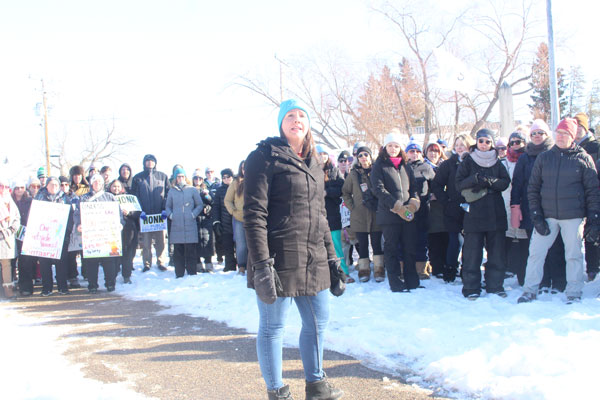The Saskatchewan Teachers’ Federation (STF) voted overwhelming against the government’s ‘Final Offer’ over May 8-9.
In results announced Thursday evening with 92.2 percent of Saskatchewan
Teachers’ Federation members casting a vote over the two-day period and 90 per cent of those voting against the offer.
“This vote is a clear demonstration of the high level of engagement of teachers throughout this entire process, and also shows the results that they have to fight for their students and for public education,” STF President Samantha Becotte said in a media availability on Friday.
At an event in Saskatoon, Minister of Education Jeremy Cockrill addressed the vote and said classroom complexity would not be included in any new mandate. Becotte said the issue had been a priority for teachers, students and members of the public.
“We want to ensure that all students have access to the supports that they need to be successful in their education,” Becotte said.
Cockrill also said that he wanted to better understand the priorities and interests of teachers. Becotte said that sounded encouraging on the surface, but the Minister’s comments display high levels of indifference, something she said has been quite common over the last year of
bargaining.
“It is something that I find very concerning and should be a concern for others in the public that are connected to education or not,” Becotte said.
He also said that the STF has silenced teachers.
“Their voice came through loud and clear through this vote and has through their actions over the course of the last year,” Becotte said.
“My question is, will this Minister finally listen or will he continue to ignore the messages from Saskatchewan teachers, their students and their families?”
The Teachers’ Bargaining Committee has extended an invitation to the Government-Trustee Bargaining Committee to return to the negotiating table with a new mandate on May 13-14.
Teachers anticipate that the GTBC will accept the invitation and return to the bargaining table, and therefore will not immediately recommence sanctions.
Before the recent vote, the STF had escalated to a work-to-rule in April. Becotte said the vote to reject the offer was a reset and that she is hopeful negotiations will move forward quickly.
“It depends on the response from the government, they have the ability to provide a new mandate to their bargaining team. They have the ability to negotiate on classroom complexity. We just need the political will from this government, and if they are concerned about what this looks like, if we can’t get that genuine back and forth, then binding arbitration is an option,”
Becotte said.
Becotte added that when she talks to members, compensation and classroom complexity were top priorities.
“We are going to do a little bit of data collection in terms of what the membership sees at this point, what they need to see going forward,” Becotte said.
She added that she is also hearing about problems with recruitment and retention.
“We need to make sure that we are keeping the high quality, experienced teachers who are from Saskatchewan in Saskatchewan,” Becotte said.
She said this comes down to good working conditions and feeling supported, but also compensation.
During the interview, Becotte said starting salaries for Saskatchewan teachers are about 4.5 per cent below the Western Canadian average, while the highest paid teachers receive about 3.5 per cent less that their counterparts in other western provinces.
Becotte said these issues need to be addressed in the contract and ensure that quality education can be delivered by certified, qualified teachers.
At the media availability Cockrill expressed his disappointment with the vote.
“The government feels like it was a very fair agreement that we came to,” Cockrill said.
“Obviously, government has made some significant investments in K to 12 education in the last budget of nine per cent increase in school operating funding, the largest increase we’ve seen in provincial history.”
He added that the funding agreement with the SSBA ensures that classroom funding stays consistent over the next four years.
Cockrill said that there will be discussions about returning to the bargaining table next week and that he had a telephone conversation with Becotte on Thursday evening.
“From my perspective, I want to make sure that any discussions that do happen are productive,” he said.
Cockrill said that during their conversation on Thursday evening both he and Becotte agreed that the process should be done at the bargaining table. He also stated that the government is not considering enacting back-to-work legislation because it does not make sense in a work-to-rule scenario.
According to Cockrill, the agreement would have kept Saskatchewan teachers above the Western Canadian average.
“The result is disappointing because again, government feels like this was a fair a fair deal and a good agreement for teachers. But you know going forward it means we’re going to have to get back to the bargaining table,” Cockrill said.
Cockrill added that the government is committed to going ahead with graduation ceremonies.
He said that in his conversations with divisions, 24 of 27 school divisions will be able to have graduations even if there is job action.
“Those 24 divisions have figured out ways around that,” Cockrill said. “There’s still obviously a small number of divisions that are going to have to figure out how we do that.
The Ministry of Education has asked for how we can help with that to ensure that all students in Saskatchewan have the opportunity to walk across the stage who are graduating this year.”
Late in the day the STF announced that On May 15 and 16 teachers will vote on giving the STF Executive a mandate to implement sanctions beyond the current school year, as the existing mandate expires on June 30. Results of this sanctions vote will be shared with STF
members and the public once voting closes on May 16.
michael.oleksyn@paherald.sk.ca


